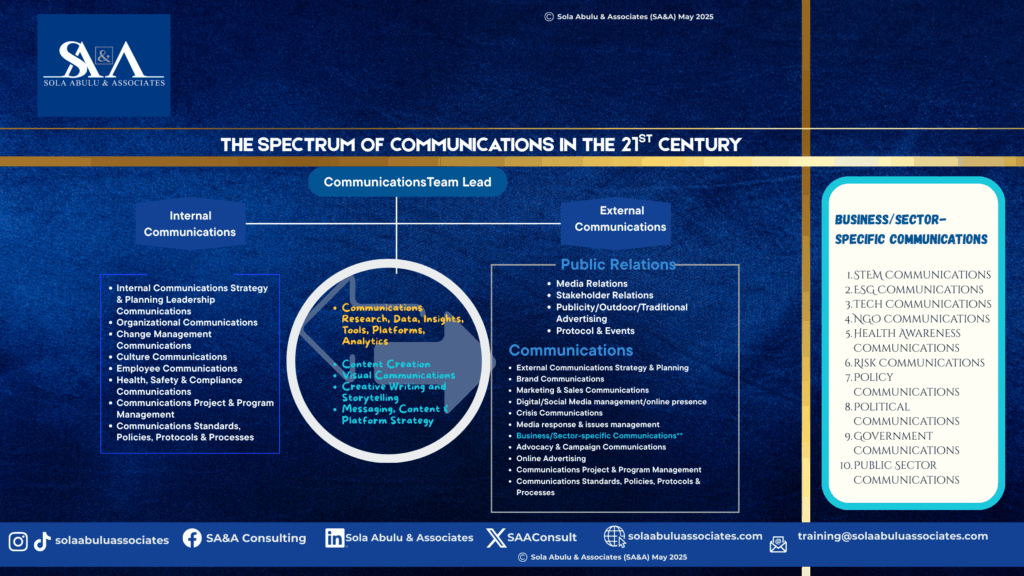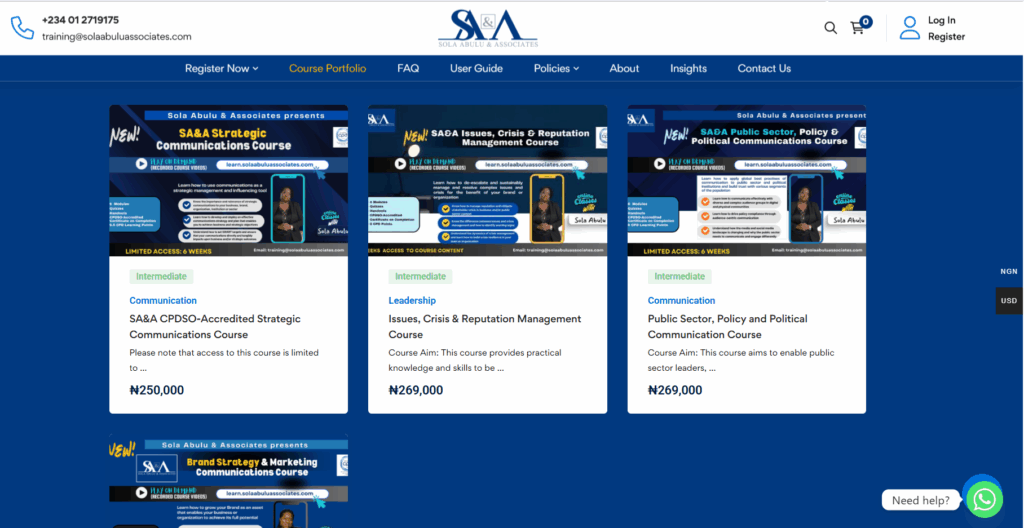The Spectrum of Strategic Communications in the 21st Century

There is a wide spectrum of fields in modern day practice of communications. As the world becomes more connected and the information space becomes more crowded, the practise of communications has become more structured, organized, scientfic and specialized. To function adequately in the field as a Corporate Communications leader or practitioner, it is important to be clear about what the practise is actually about.
The following are a list of things that would help a communications professional determine how best to grow on their journey of communications .
- Identity: A communications professional needs to be very clear about who and what they are. I say this because if you do not know who you are, you become anything anyone says you are. And I see this happen in a lot of contexts where communications professionals are asked to do things that no one else wants to do e.g. organize send-off parties. For as long as you continue to take on mundane tasks that require little or no expertise, it would be very difficult for people to see you as being more than a party-planner of a meeting scheduler.
- Purpose: The practise and profession of Strategic communications evolved in the 21st century as a way of enabling organizations and businesses to be more structured, intentional and effective in their communications and engagement with internal and external audiences and stakeholders. It arose because it became clear that specialist expertise is required for communication to be delivered effectively to a large section of recipients in such a way that it lands as intended and enables the achievement of desired objectives. This particularly is important when follow-up action is required as an outcome of the communication or a shift in perception is the objective. This would require some level of expertise beyond the grasp of just anyone.
- Self-reflection: Many people have found themselves accidentally in a communications team. In many large organizations, it has become customary to put anyone with an aptitude for public-speaking and inter-personal skills in the communications team – based on the mis-conception that anyone can do communications. If that was your experience, it may be time to think about whether this is something you would like to do long-term as your commitment and passion would go a long way to determining how successful you are in the profession over a long perio of time.
- Skills:To be a communications professional, there are certain skills you must have. You must be a good writer. Someone who can break down concepts into explainer words. You can write a draft for a short press release in less than 30 minutes. You understand the difference between internal communications and external communications. You can build a communications strategy from scratch. You understand the difference between a communications strategy and a communications plan. You know how to quantify the value of your communications. You know how to drive change or achieve real-life tangible impact through communications. You can solve business and organizational problems through strategic communication. If you can do all or most of this – then you are a 21st century-compliant communications professional.
- Expertise:To be a communications professional – you need to have a combination of many sets of skills. And the skills occur in different levels – from awareness, knowledge, to skill and then mastery. Specialisms in the profession include expertise areas like media relations, internal communications, communications strategy and planning, crisis communications, marketing communications, brand strategy, digital and social media strategy, communications research, data and analytics, stakeholder communications and engagement etc. How familiar are you with these terms? To be a communications professional or leader in a major organization, you would need to have working knowledge as well as skill and mastery in some or all of these areas. (see the graphic above).
- Competencies:Competence is a pre-requisite to expertise. You can only begin to develop expertise in an area when you have become so competent that you have devised your own approach of working in that space. You have developed a level of expertise that is your differentiator in the process and becomes a unique identifier for you. Competence makes you employable but expertise makes you irreplaceable.
- Generalist vs Specialist: To be a well-rounded communications professional, you need to determine whether you aim to be a generalist in a broad spectrum of focus areas or you want to specialize in just one area. It is important to think very carefully about this because this would determine your career trajectory in future. E.g. if you chose to be a media specialist or internal communications specialist, it is unlikely that you would be able to transition into a generalist communications leadership role at some point in the future – if it is glaringly obvious that all you have done has been in that one area. The same thing if you have being in marketing communications – you need to decide if you would like to transition to corporate communications and when to start looking for opportunities to do so before it becomes too late. Corporate communications focuses on managing long-term reputation of the brand so is very different from the short-term marketing communications approach.
- Experience: Getting the experience you need to grow into certain comptence areas may not be fully in your control but there are somethings that are in your control. Training and certification help to move you into the knowledge space. Seeking volunteer opportunities with professional associations or non-profits etc could move you further into the skilled zone with each competence. Doing nothing would get you nowhere. A big mistake that many communications professionals make is waiting for their day job to provide the learning opportunities for them to grow in other areas of the profession. This does not happen. Even in big and prosperous organizations. Take what you can from within the organization and look for the learning, experience outside of the organization through membership of professional associations, training and certification and volunteering for communications roles with NGOs and non-profits that do not conflict with your day job and official roles or compliance rules.
SA&A is a strategy and communications consulting and training firm focused on enabling businesses and brands to achieve their objectives through strategic communications, organizational effectiveness and reputation risk management. SA&A is also an accredited training provider with the CPD Standards Office in the UK. Since November 2023, SA&A has trained over a hundred communications professionals, consultants and business owners in various aspects of strategic communications. To enrol for SA&A courses from anywhere in the world, please visit learn.solaabuluassociates.com
The following play-on-demand courses are currently available on the website. And accessible from anywhere in the world
- SA&A CPDSO-Accredited Strategic Communications Course (6 module course and 6 hours of lectures)
- SA&A CPDSO-Accredited Brand Strategy & Marketing Communications course (4 module course and 6 hours of lectures)
- SA&A CPDSO-Accredited Issues, Crisis & Reputation Management Course (4 module course and 6 hours of lectures)
- SA&A CPDSO-Accredited Public Sector, Policy & Political Communications Course (4 module course and 6 hours of lectures)
Email: training@solaabuluassociates.com
Subscribe to our YouTube Channel:

